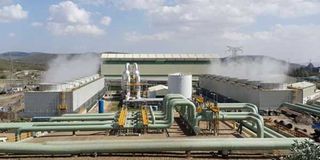Energy management has huge benefits

Geothermal power generation in Olkaria. FILE PHOTO | NATION MEDIA GROUP
What you need to know:
- With the increasing world population, energy requirements for domestic, commercial and industrial applications is outstripping supply.
- Most countries still rely on the finite fossil fuels for energy — despite the associated negative environmental and health effects.
- Industrialisation is a key pathway towards creation of a reasonable economy.
- Energy management is the planning, operation and utilisation of energy with a view to conserving resources, while promoting environmental protection.
Energy is one of the key enablers of socio-economic development. But with the increasing world population, energy requirements for domestic, commercial and industrial applications is outstripping supply.
In addition, most countries still rely on the finite fossil fuels for energy — despite the associated negative environmental and health effects.
One of the mitigation measures to these challenges is energy demand side management through adoption of efficiency practices. This is a paradigm shift from the traditional efforts of working to strike an equilibrium between supply and demand using energy generation.
Energy management is the planning, operation and utilisation of energy with a view to conserving resources, cutting down on costs while promoting environmental protection. It also focuses on cutting down on the energy used to provide goods and services.
CONSUMPTION
Energy management systems must address the basic three Cs of energy — cost, consumption and carbon. It is, therefore, a powerful tool to cut costs and improve competiveness while demonstrating leadership and environmental stewardship. An ad hoc, bottom-up approach that culminates in sensible short-term savings, leaving a lot of opportunity on the table, is employed.
Industrialisation is a key pathway towards creation of a reasonable economy. The global manufacturing sector consumes a third of the energy and, therefore, efficient consumption and management in modern manufacturing business should be encouraged.
A more systematic approach to energy management can improve predictability, performance and profitability. This correlates very well with the story of an Egyptian firm, Arabian Cement Company. Many were left wondering how a cement manufacturing company could win top honours from Clean Energy Ministerial (CEM8), a high-level global forum that advocates for policies and programmes that encourage the use of clean energy.
LIMESTONE
Cement contains 95 per cent clinker, a substance whose production involves heating limestone to temperatures of 9,50o degrees Celcius beside huge amounts of electricity used to grind the raw materials and finished cement.
For ACC to qualify for the awards, which is made up of over 17 countries, it had to present a comprehensive description of its experiences and outcomes of using ISO 50001 — certified energy management system — and the benefits.
The benefits included 8 per cent energy performance improvement over three years; $9 million annual energy cost savings and 1.3 years’ payback period; 130,000 tonnes of carbon emissions kept away for over three years; reduced operations and maintenance cost; and superior competitiveness emanating from reduced cost of traditional energy.
EFFICIENCY
ACC achieved better competitiveness, higher operation efficiency, improved maintenance practices and, consequently, more profit margins.
In Kenya, a number of organisations are putting in place energy management procedures and processes. This is commendable, considering that studies show 40 per cent energy wastage in local industries.
However, more needs to be done. A good point of reference is the Energy Management Regulations 2012 being enforced by the Energy Regulatory Commission (ERC). They require industrial, commercial and institutional energy users who consume more than 180,000 units of electricity per year to put in place measures to better manage energy consumption. This is for the wider benefit of the country.
To tap the benefits of energy management, companies need to establish and implement policies such as defining clear and measurable energy savings targets at every level of its processes. They should measure, track and analyse energy data, as well as document actual energy use across the enterprise in order to set baselines and goals.
SENIOR MANAGEMENT
Analysis can be a very important tool for communicating progress to senior management and aiding in identifying deficiencies and trends in order to pinpoint best practices and validate energy management practices.
Organisations should also benchmark on their energy utilisation index (EUI) with peers in a similar industry.
Energy conservation and management is not a preserve of huge corporates. It is also a sure path to sustainable living for both individuals and businesses.
Mr Oimeke is director-general of the Energy Regulatory Commission (ERC). [email protected] Twitter: @Paveloimeke





